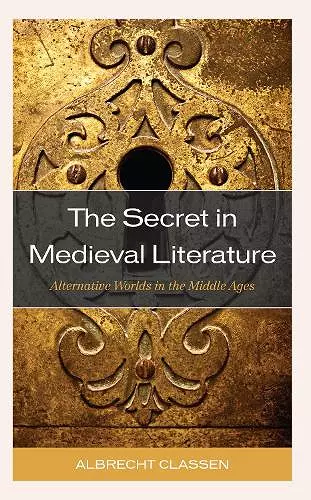The Secret in Medieval Literature
Alternative Worlds in the Middle Ages
Format:Hardback
Publisher:Lexington Books
Published:21st Oct '22
Currently unavailable, and unfortunately no date known when it will be back

The Secret in Medieval Literature: Alternative Worlds in the Middle Ages explores the many strange phenomena, both in the Middle Ages and today, that do not find any good rational explanations. Those do not pertain to magic or to religion in the traditional sense of the word; they are secrets of an epistemological kind and tend to defy human rationality, without being marginal or irrelevant. At first sight, we might believe that we face elements from fairy tales, but the medieval cases discussed here go far beyond such a simplistic approach to the mysterious dimension of secrets. In fact, as this book argues, medieval poets commonly engaged with alternative forces and described their workings within the human context (both in the Latin West and in the East), without being able to come to terms with them critically. Those mysteries appear both in heroic epics and courtly romances, among other genres, and they figure more frequently than we might have assumed. On the one hand, we could conceive of those secrets as the product of literary liberties and imagination; on the other, those secrets prove to be rather serious agents intervening in the lives of the fictional protagonists. By the same token, our modern world is not all rationality and material conditions either. The study of secrets in the Middle Ages thus opens the pathway toward a new epistemology both for the people in the pre-modern age and us today.
Albrecht Classen, in The Secret in Medieval Literature, explores the concept of the secret, a hidden world where things happen that are supposed to be removed from public awareness, from the knowledge of the uninitiated or protected from abuses by the masses. Specifically, in a wide variety of texts, including medieval classics such as the Lais of Marie de France and Wolfram van Eschenbach’s Parzival, he studies the function of the secret as a narrative motive and not just as an explanation for faintly mysterious phenomena. This analysis of pre-modern literary works from the perspective of strange or inexplicable incidents and objects that move the account forward is a unique approach. It is not another book about religion, magic, or mysticism but rather a fresh look at what was considered privileged knowledge and how that knowledge alluded protagonists in medieval works.
-- Connie L. Scarborough, Texas Tech UniverISBN: 9781666917864
Dimensions: 239mm x 160mm x 24mm
Weight: 558g
294 pages